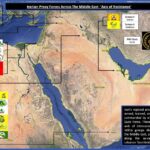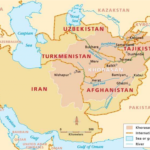The creation of the lawfare division with the Pakistan Army is an excellent step in combatting terrorism for a number of reasons, but those reasons find their place in the lack of international law.
As we all know, international law is created based on cases presented before the relevant court. Each country of the world has their own laws, but there is no law that covers international incidents. This is the reason that the US government must suspend executive orders, issue blanket immunity and continuously improve their systems of civil and military jurisprudence to handle the cases that are presented before them. It is also one of the main reasons that before any invasion, the US government will demand that the government of the country they have invaded signs a blanket waiver of criminal prosecution, within that country, of it’s soldiers, officers and government functionaries for any acts that may violate the national laws.
When we look at the concept and logic behind the creation of a warfare division, the understanding follows the model that the US government has created within their national security establishment. Let’s break that down and understand it in the context of Pakistan.
- Arrest and Extraditions
While many countries use the distinction “enemy of the state” to apply to many different things from dissidents to those who take up arms against the government of the day, in today’s volatile world, one definition the world agrees on is terrorism. Any individual involved in the financing, support or execution of a terrorist act is an enemy of the state is the basic definition. Here’s where it gets muddy.
Within our own borders, it is easy to declare, arrest and prosecute terrorists, but when they are outside our borders, we have no recourse to bring them back to Pakistan because confidential, classified information will need to be shared with a foreign government, as well as the civil courts for arrest and extraditions. That classified information becomes a matter of public record.
When we move to the a lawfare model, with the cases being presented to either the United Nations Security Council or the relevant military court in another nation, the understanding of classified/confidential information can be protected and redacted documents are supplied. Currently, Pakistan receives dossiers from foreign governments for the arrest and extradition of their citizens based on crimes against the state, which follow as similar model.
- Prosecution
Again, stepping out of the civil jurisprudence system, most enemies of the state are not presented in the civil courts. Rather they are presented before a tribunal or military court for their acts against the country, ranging from treason and material support to a terrorist organization to an act of terrorism itself.
With the lawfare model, our military will be presenting its evidence to another military court, JAG corps, or officer that understands that an individual is guilty under the laws of Pakistan and most likely the laws of whatever country they may be residing. The prosecution is then moved through the military courts of that country or a relevant tribunal created to hear these cases under the auspices of the United Nations or a combination of nations. It will be their responsibility to determine whether the case should be tried in their courts or the individual returned to the court of origin for prosecution.
- Diplomatic Relations
Without a proper lawfare model, the diplomatic relations between countries can be severely damaged when a foreign national is charged with a crime. It’s damaged even more when disenfranchised citizens are arrested on a foreign battlefield. Let’s take a look at the cases from early in the War on Terror where Uzbeks and Tajiks were arrested on Pakistani soil.
When the Uzbeks and Tajiks were arrested by the Pakistan security establishment, international protocol deemed that they must be deported back to their country of origin to be prosecuted for their crimes there. This was because they were not legally within the borders of Pakistan, i.e. no visa, so our only options were to imprison them for their crime of entering the country illegally and deporting them back to their country of origin for prosecution for their involvement in terrorist activities. Easy enough, right? But when Uzbekistan and Tajikistan governments refused to accept their extradition, Pakistan was stuck not having the ability to legally prosecute these terrorists in our civilian courts. Rather than holding them for illegal transit to Pakistan, the Pakistani government handed them over to the US for imprisonment at Gitmo for terrorist activities.
With the lawfare model, we are able to not only prosecute, but sentence, foreign nationals caught on our soil involved in terrorist activities through our military courts. The foreign national is able to have an attorney, but the proceedings take place in a military court, rather than a civilian one, meaning that confidential information can be placed in the record without any concern of it being leaked. This also protects the diplomatic relations between countries because the only forum for discussing this model is the United Nations Security Council, not a civilian court.
Syed Khalid Muhammad, the Founder and Executive Director of CommandEleven, brings over three decades of leadership experience, guiding organizations globally in the realms of security, technology, marketing, and management. Notably, he authored "Agency Rules: Never an Easy Day at the Office," a pioneering espionage novel published in 2013. This novel holds historical significance as the first English-language espionage novel written by a Pakistani, achieving international bestseller status and currently available on Amazon.
Furthermore, Syed Khalid Muhammad has made notable appearances on several international TV channels, providing insightful analysis on security and geopolitics.
Since the establishment of CommandEleven in 2015, Khalid has expanded his expertise to encompass analysis, risk and threat assessment, and consultancy in the fields of terrorism, counter-terrorism, counterintelligence, geopolitics, and cognitive warfare. Within CommandEleven, he has successfully cultivated a comprehensive human and electronic intelligence network spanning the Indian subcontinent. Continuously growing, this network extends into various conflict zones globally, providing CommandEleven with actionable, real-time intelligence that forms the foundation of its analytical endeavors.
CommandEleven currently serves multiple clients, including corporate giants, by assisting them in analysis related to security, threat assessment, and threat mitigation strategies in Pakistan and Afghanistan.









